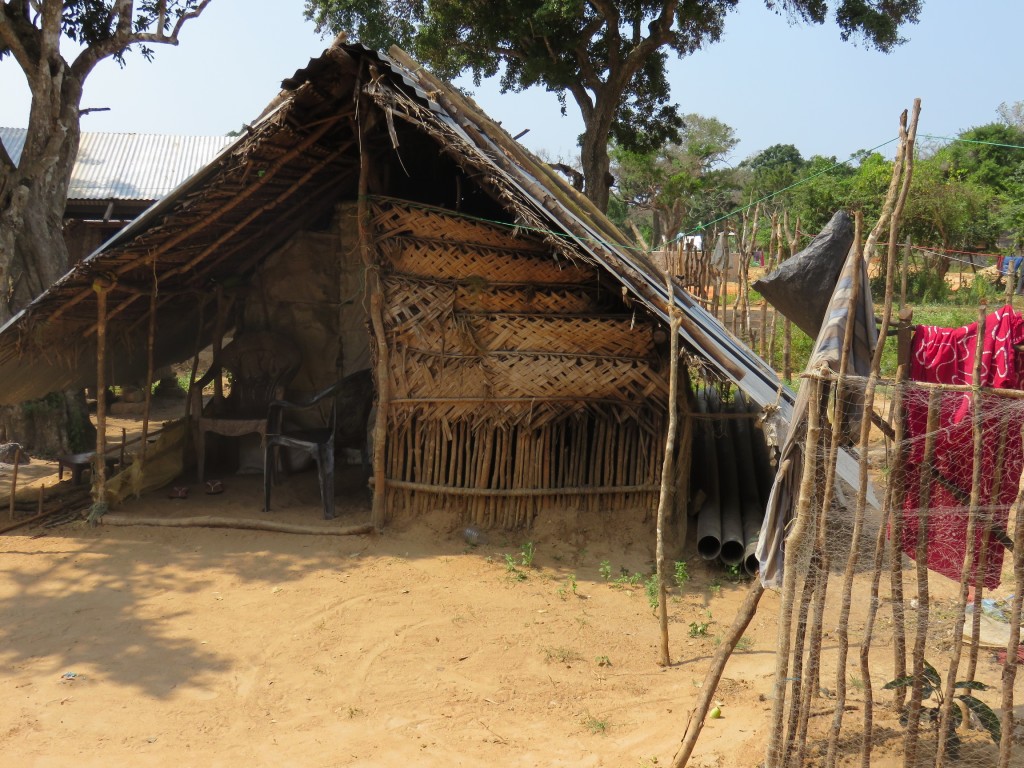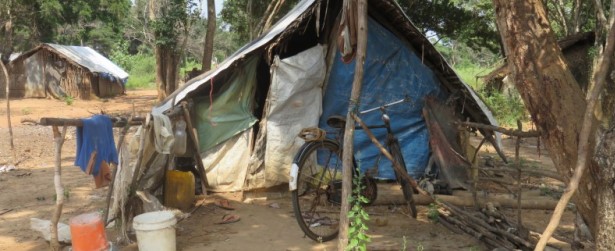[ A cajam shed of the original inhabitants; Image credit: Ruki]
by Ruki Fernando –
Last week, I went to Mullikulam, a beautiful and resourceful village in the Mannar district, which has been illegally occupied by the Navy for more than 7 years. It was my first visit for more than a year. The people didn’t seem to have any fresh hopes of reuniting as one community, regaining their lost lands, houses, fishing and agricultural activities and being close to the school and historical church they are devoted to.
Access to the Catholic Church in Mullikulam is still restricted and appears to be getting worse. When two of my friends (one a Catholic Priest) tried to go to the Church on 21st January, they were refused entry by the Navy. The Navy had initially used the excuse to say that the national identity card of one of my friend was issued recently, to which my friends had replied that date of issue of the identity card is irrelevant. Later, they had tried to say that the Priest in charge of the church was not in the church, thus, other Priests and lay Catholics will not be allowed to go. This was after the visiting Priest had made it clear that they were going to visit the historical Church and pray, and not to meet the Priest in charge. The Navy had then insisted that the Church was in their compound, but my Priest friend had retorted that the Navy was trespassing on Church and people’s land, which indeed is the correct legal position. After waiting for around 45 minutes, they still were not allowed to go to the Church.
Last week, I went to Mullikulam with a Catholic priest. Our motorbike was stopped at the sentry point to the village, which is now a Navy camp. We told the Navy we were going to the Catholic Church inside the village. The young Navy officers struggled to contact their superiors. They made us wait for almost half an hour. We were told repeatedly that it would have been better and easier if we had informed that we were coming beforehand. My priest friend ignored and waited. “Why should we get permission or inform early to go to a Church, in church owned land?” was his thinking. Finally we got clearance and went to the Church. We saw Navy families, including children, in houses that have been built by humanitarian agencies for the people of Mullikulam. We also saw a volleyball / basketball court. The Navy appears to be consolidating their hold and presence.

Amongst the worst tragedies of the illegal occupation was the division of the once close-knit community, which is now scattered, divided and lives in at least 3 separate areas.
Some significant things had happened in 2014. In January 2015, villagers and the Catholic Bishop of Mannar had reminded the then Governor of the Northern Province about commitments made by the then Defense Secretary, during former President Rajapakse’s visit to Mannar for the election campaign. Land permits for a half acre of land in the cleared jungle area had been given to the displaced. Some had received them in mid 2014 from the President and others had received them in November 2014. At least in one case, authorities had tried to exchange this new document for old permit a family had held for land in Mullikulam, but the family had resisted. In mid 2014, those living in cadjan and tin sheet houses were given 12 tin sheets and 8 cement bags by the Divisional Secretariat. A Tamil National Alliance (TNA) Provincial Councilor had also given approximately Rs. 50,000 to some families, in installments, but parts of it has not been received yet. These were to build new temporary shelters. People we met told us that this was not enough even for a basic 16 feet x 12 feet temporary house.
These people still can’t go fishing in most fertile part of the sea due to Navy occupation. They still don’t appear to have access to all the lands and tanks for cultivation.
The newly repaired, smooth “carpet” road from Mannar was an absolute contrast to the state of housing of the people whose lands and houses have been taken over by the Navy.
There was also another contradiction we experienced. On our way to Mullikulam, we saw lots of newly built houses. It appeared to be part of a special housing project. The roof of these houses had the sign “Jassim” implying that donor was “Jassim”. The area was named “Sh. Jassim City”, and according to the billboard, it is a 279 house project with two small Mosques and one Grand Mosque. Except few houses, vast majority of these houses appeared to be empty. The reasons for new permanent houses without people and people without even temporary houses in the same area is perhaps a question that needs to be addressed by the Divisional Secretariat or other relevant authorities.
I knew the Mullikulam community as a courageous and high spirited community, which had struggled hard to go home to their village. But now, they appeared to be have given up any prospect of going home to their beloved village. But one elderly person from Mullikulam did tell us that they still had some hope. I hope it will remain. I hope it will inspire them to renew their struggle to go home under the new government. I hope it will inspire others who care to support them.
Will the new era of “yahapalanaya (good governance) and rule of law, review the legality of the occupation and deal with those responsible? And what has “Maithree Palanaya” (compassionate rule) have in store for people of Mullikulam, who had lost their houses, agricultural lands, access to best fishing areas, constant and direct access to their historical church, and most importantly, their sense of community?
[Photos taken on 21 January]
